8 Ways to Keep Your Pet Safe on July 4th, According to an Expert
Global Veterinarian Dr. Danielle Bernal shares with PEOPLE ways to protect your pet on Independence Day, including firework and barbecue safety tips
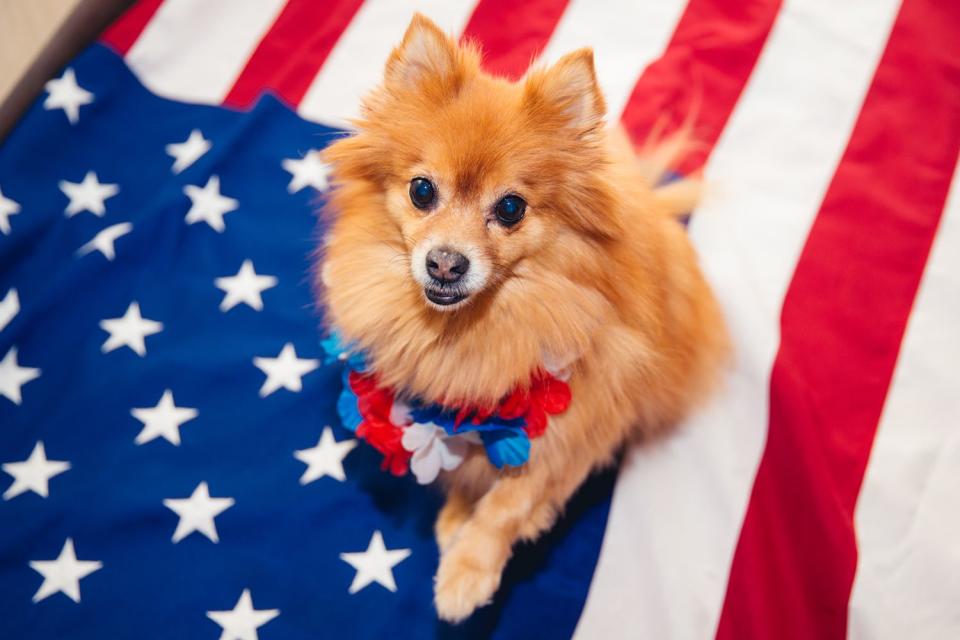
Getty
Patriotic Pomeranian sits on an American flagHot dogs aren't the only dogs to prioritize on the Fourth of July!
Synonymous with backyard barbecues and fireworks galore, Independence Day is an anticipated summer celebration enjoyed by family and friends — however, pets shouldn't be overlooked when the festivities commence.
While Fourth of July traditions are fun for humans, some can be frightening and overstimulating for dogs and cats. Activities involving fire, like sparklers and fireworks, can also be dangerous to their health if proper precautions aren't taken.
Dr. Danielle Bernal, global veterinarian with Wellness Pet, tells PEOPLE it is important to identify your pets' stressors ahead of time since "every pet is unique." In contrast, she says some dogs and cats "may not react" to fireworks or other festivities at all!
Related: Nathan's Fourth of July Hot Dog-Eating Contest: The Wildest Rules Competitors Have to Follow
Common signs of stress and anxiety look different in pets. For cats, Dr. Bernal says they "may show signs of increased vocalization, excessive grooming, urinating outside of the litter box, unusual aggression, hiding or diarrhea" when stressed or anxious.
"Excessive barking, destructive chewing or digging, panting, trembling or shaking, pacing or restlessness, avoidance of eye contact and repetitive behaviors like licking or biting" are a few of the most common signs she notes of dogs.
Should your pet demonstrate either of these behaviors that may be of concern to you, Dr. Bernal says it's "always good to talk to your pet’s veterinarian." She says, "They will be able to advise if this is anxiety or potentially something more serious."
Read on for eight ways you can protect your pets this Fourth of July, according to Dr. Bernal.
Keep your pets inside if loud noises stress them out

Getty
Fourth of July fireworks.To minimize stress on Fourth of July, keep your pet away from the action all together to ease their nerves.
Dr. Bernal says "it’s best to keep them inside during celebrations" if your pet "is anxious about or stressed by fireworks and other loud noises." She explains, "This will help ensure they remain in a calm environment and reduce the risk of running away."
Related: The Best Red, White and Blue Desserts Recipes to Make for the Fourth of July
Create a safe space for your pet during the festivities
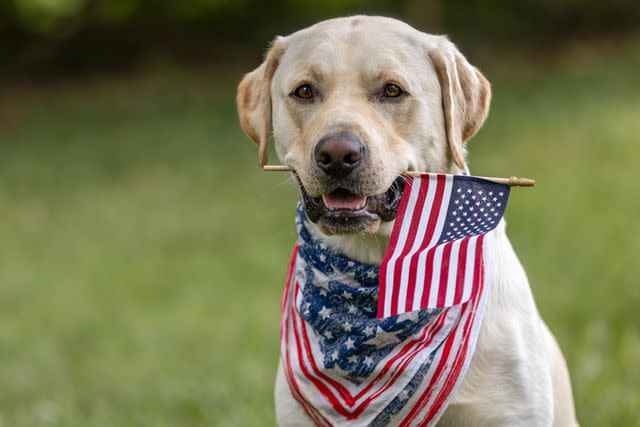
Getty
Labrador Retriever holding an American FlagIf you choose to keep your pet indoors, chances are they will still be able to hear the loud fireworks if they're being launched near your home. In that case, Dr. Bernal shared a few ways to distract and occupy them during the event.
Her first suggestion is to create a safe and comfortable space for your pet to retreat during the fireworks. "This could be a crate, a room or a designated area in your home," she says. "Playing calming music can help to drown out the sound of fireworks and promote relaxation in your pet."
Try to take your pet's mind off the loud noises. Dr. Bernal explains, "Providing your pet with toys or treats can help to distract them from the noise of fireworks and keep them occupied."
Comfort your pet if they're unsettled by the loud noises. "Dog-specific compression wraps and blankets use gentle compression like a whole-body hug to provide comfort for some pets and reduce anxiety about fireworks," she says. "Some cats may prefer to curl up in a blanket or comfy bed as well."
Take proper precautions when dealing with fireworks

Getty
Patriotic kittens snuggle together in a basket.While Dr. Bernal says it's best to keep your dog or cat inside when nearby fireworks are going off, she suggests "tethering pets" if they do stay outside for the event. This will ensure they don't go near any flames.
"Use all fireworks according to safety regulations to ensure your pets are not the casualties of irresponsible fireworks usage," she adds. For example, have a water bucket and hose nearby.
To keep your pet calmer during the fireworks, Dr. Bernal advises that your pet is well-fed, has a good sleep the night prior and can see you at all times during the festivities.
"Create good lighting outdoors so they do not feel disoriented with the bursts of light from the sky," she adds.
Keep sparklers away from pets

Getty
Fourth of July sparklerSparklers have an uncontrollable flame that can "easily burn cats or dogs." Therefore, Dr. Bernal says it's best to keep them "out of reach" and "away" from your pets.
"Sparklers can easily burn cats or dogs and chemical additives can cause severe gastrointestinal issues for either species if ingested," she explains. "The unusual lights can be enticing, but it’s important to keep pets separated and safe."
Assess and take action if your pet gets burned by a firework or a sparkler.
"If the burn immediately appears to be severe, contact the vet immediately. Keep the wound covered to prevent infection and gently rinse the area with cool water," Dr. Bernal advises. "For moderate to severe burns, seek professional help as soon as you can. Burns can lead to infection, shock and other issues for pets."
If your pet ingests a piece of the firework or sparkler, Dr. Bernal says to "call your vet or emergency services as soon as possible." In the meantime, keep your pet calm and be sure to monitor them closely.
"If any pieces or objects are still within reach, carefully remove them from your pet’s mouth to avoid any additional ingestion," she says. "Do not induce vomiting unless instructed by the veterinarian."
Related: These Jam-Filled Butter Cookie Sandwiches Are an Easy and Festive Fourth of July Treat
Put pets on a leash to prevent them from running away
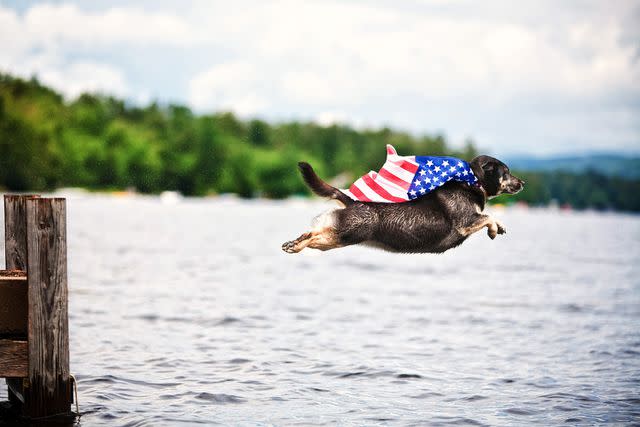
Getty
Dog soars over the water wearing the American flag as a capeDr. Bernal notes that "more pets get lost on July 4th than any other day of the year!" This is because light and noise from fireworks may send pets into a panic.
"They want to escape — and when they do, they can easily get away," she says. If you have a cat or dog that might be exposed to fireworks, she suggests taking a photo of your pet, making sure their ID tag is on and is visible and ensuring their enclosure or fencing is secure.
Again, Dr. Bernal stresses it's best to keep your pet indoors, if possible. "If your pet is indoors, then you know he or she cannot run away."
Don't share BBQ food with pets
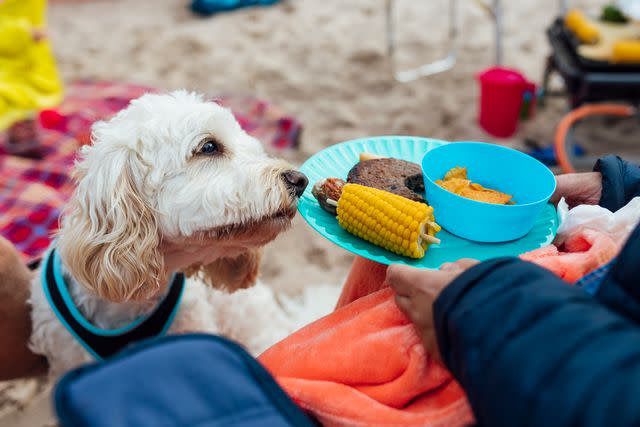
Getty
Dog sniffs food from the BBQ.Sharing is caring, but not always with pets! "Make sure to talk to any guests, especially kids, before summer parties and remind them not to feed your pets any food," Dr. Bernal advises.
"Dogs and cats are used to eating the same foods every day. Their gastrointestinal tracts develop a natural flora or bacteria that specifically digests their regular food," she explains. "When they get something that they aren’t normally accustomed to, such as burgers or hot dogs, they can develop severe inflammation with vomiting and diarrhea."
Additionally, many foods are toxic to our pets — such as grapes, onions, garlic and raisins — if they are consumed in large quantities. "Grapes and raisins are safe for cats but keep onions and garlic away from them," she says.
Some Fourth of July BBQ foods can be hazardous to pets and "be a risk of choking or obstruction," Dr. Bernal adds. Among them include corn on the cob, fruits with pits, and foods with bones, toothpicks or skewers.
Keep your pets cool in the summer heat
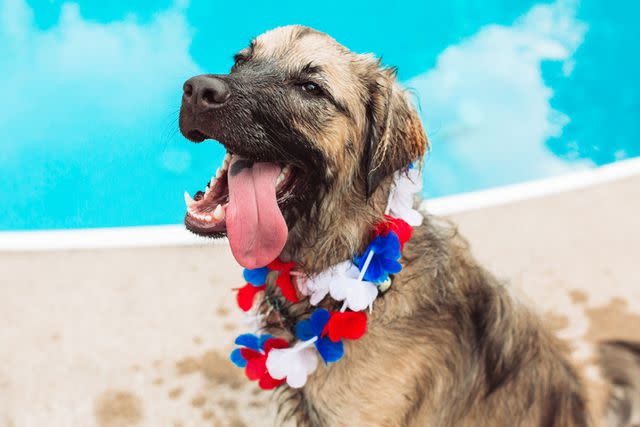
Getty
Dog with tongue out by the poolWhile time spent outdoors is beneficial for pets when it comes to exercise and their overall well-being, Dr. Bernal says pet parents "need to be mindful" as temperatures increase. This goes for the Fourth of July, as it falls smack in the middle of the summer months.
"Do not put a muzzle on a dog while they are out in the heat," she says. "There is a reason why dogs start panting when they get really hot, it is a natural way of controlling their body temperature."
Dr. Bernal explains, "When you put a muzzle on a dog while they are out in the heat, you are preventing this natural process from occurring, which can lead to overheating or heat stroke."
Use your own judgment to determine what's best for your pets' health in the summer heat. "If it's too hot for you to be outside for an extended period of time, then you should consider it too hot for your pet as well," she says.
Lastly, Dr. Bernal recommends "always having water available for your pets to drink while on a walk or spending time outside."
Related: Walmart’s Fourth of July Sale Has Top-Rated Fashion, Patio Furniture, and More — Up to 85% Off
Keep sunscreen away from pets
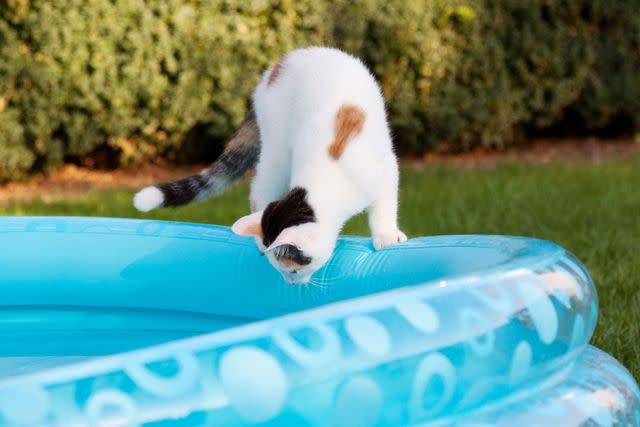
Getty
Kitten sits on a plastic blue poolDr. Bernal says sunscreen "can be risky for pets," despite it being a vital resource for humans.
"Sunscreens that are available for pets are often not FDA-tested," she says. "Ingestion of any sunscreen can cause stomach upsets, diarrhea and even liver damage."
Rather than relying on sunscreen, Dr. Bernal says to "be mindful of time spent outside and sun exposure for our pets." If sun safety remains a concern, she says to "talk to your veterinarian to determine the best solution for your pet’s specific needs."
For more People news, make sure to sign up for our newsletter!
Read the original article on People.


